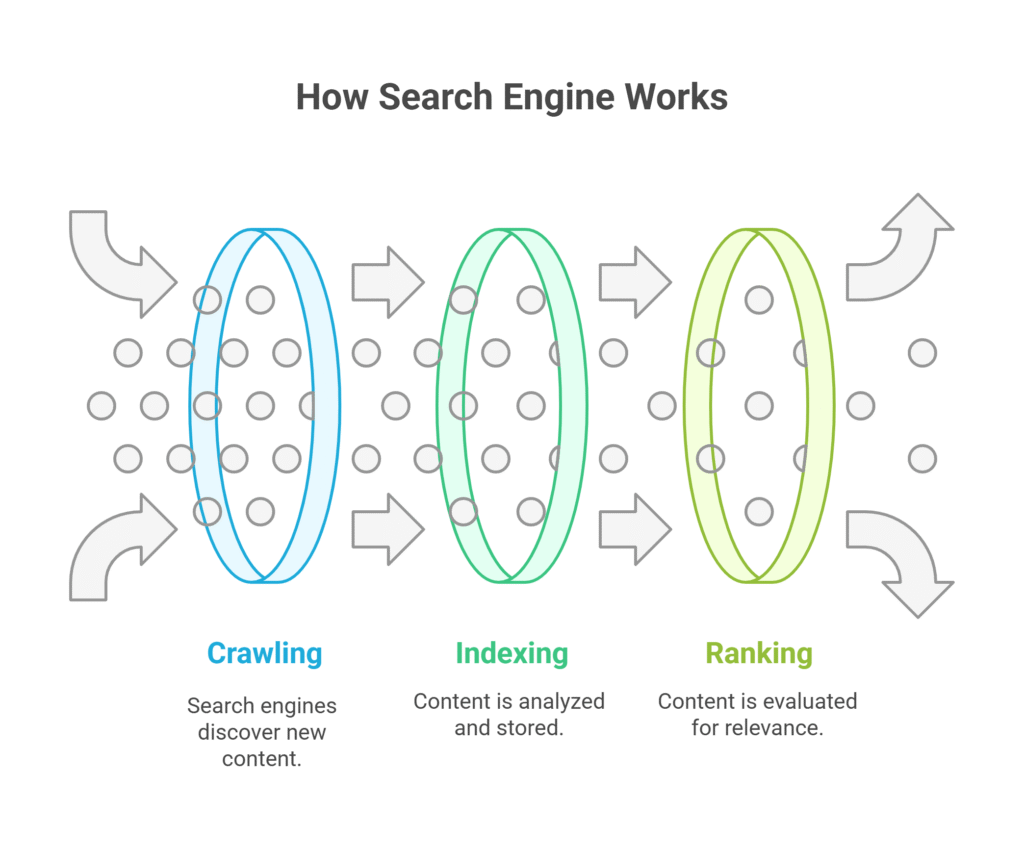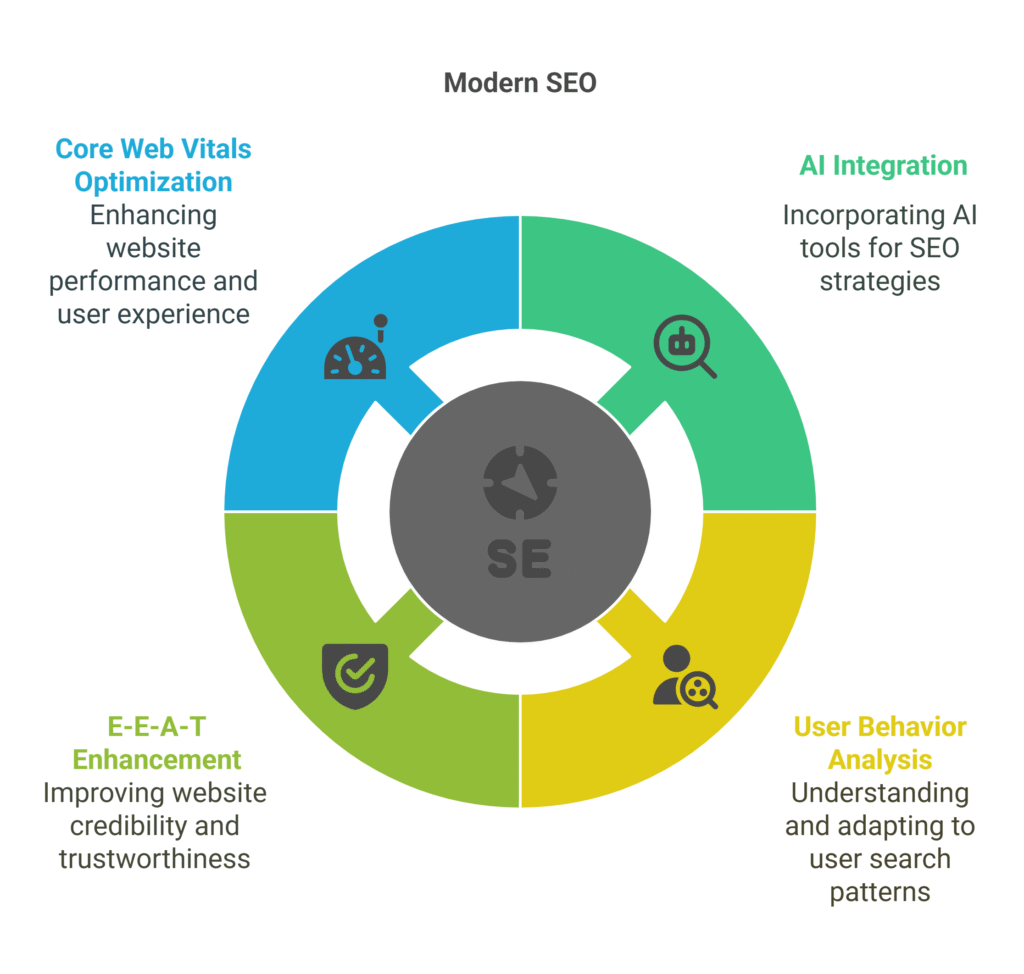Search Engine Optimization might sound technical, but it’s actually quite simple. Every day, billions of people search for information online, and SEO helps your website appear when they search for topics related to your business.
Whether you’re running a small business, managing a corporate website, or starting a blog, understanding SEO can transform your online presence. This comprehensive guide breaks down everything you need to know about SEO in 2025, from basic concepts to advanced strategies.
By the end of this guide, you’ll understand exactly what SEO is, why it matters, and how to implement proven strategies that drive real results for your website.
What is SEO?

Search Engine Optimization (SEO) is the practice of improving your website’s visibility in search engine results pages (SERPs) to increase organic traffic. Think of it as making your website more attractive and understandable to search engines like Google, Bing, and Yahoo.
When someone searches for information online, search engines scan billions of web pages to find the most relevant and helpful results. SEO helps your content appear higher in these results by demonstrating relevance, authority, and user value.
Why SEO Matters in 2025
The digital landscape has evolved dramatically, but SEO remains the most cost-effective way to drive long-term, sustainable traffic to your website. Here’s why SEO is more important than ever:
- Increased Credibility: Users trust organic search results more than paid advertisements
- Cost-Effective: SEO provides higher ROI than traditional advertising methods
- Long-Term Results: Unlike paid ads, SEO continues working even when you’re not actively investing
- Better User Experience: SEO best practices align with user experience improvements
“SEO is not about gaming the system anymore; it’s about learning how to play by the rules and creating the best possible experience for users.” – Brian Dean, Backlinko
How Search Engines Work

Understanding how search engines operate is crucial for effective SEO. The process involves three main stages that determine whether your content appears in search results.
Crawling: Discovery Phase
Search engines use automated programs called crawlers or spiders to discover new and updated content across the web. These crawlers follow links from page to page, gathering information about each website they encounter.
To optimize for crawling:
- Create a clear site structure with logical navigation
- Submit an XML sitemap to Google Search Console
- Ensure internal linking connects related pages
- Fix broken links and 404 errors promptly
Indexing: Understanding Phase
After crawling, search engines analyze and store information about your pages in their index. This massive database contains details about every piece of content they’ve discovered and understood.
During indexing, search engines evaluate:
- Page content and context
- Keywords and semantic meaning
- Page structure and HTML markup
- User engagement signals
Ranking: Relevance Determination
When users enter search queries, algorithms evaluate indexed pages to determine the most relevant results. Google uses over 200 ranking factors to make these decisions.
Primary ranking factors include:
- Content Quality: Comprehensive, accurate, and helpful information
- Relevance: How well content matches search intent
- Authority: Website credibility and expertise
- User Experience: Page speed, mobile-friendliness, and usability
- Freshness: Content recency and updates
The Three Pillars of SEO
Successful SEO requires mastering three interconnected areas. Each pillar supports the others, creating a strong foundation for search engine visibility.
On-Page SEO
On-page SEO involves optimizing individual web pages to rank higher and earn relevant traffic. This includes both content optimization and HTML source code improvements.
Essential On-Page Elements:
- Title Tags: Compelling headlines that include target keywords
- Meta Descriptions: Persuasive summaries that encourage click-throughs
- Header Structure: Logical H1-H6 hierarchy for content organization
- Keyword Optimization: Natural integration of relevant search terms
- Internal Linking: Strategic connections between related pages
- Image Optimization: Descriptive alt text and compressed file sizes
Action Step: Use tools like Yoast SEO or RankMath to optimize on-page elements systematically.
Off-Page SEO
Off-page SEO focuses on building your website’s authority and reputation through external signals. The most important off-page factor is earning high-quality backlinks from reputable websites.
Effective Off-Page Strategies:
- Link Building: Earning links from authoritative, relevant websites
- Content Marketing: Creating linkable assets like research studies and guides
- Guest Posting: Publishing valuable content on industry websites
- Brand Mentions: Building awareness through PR and outreach
- Social Signals: Engagement across social media platforms
Industry Insight: Backlinks remain one of Google’s top three ranking factors, making link building crucial for SEO success.
Technical SEO
Technical SEO ensures search engines can crawl, index, and understand your website efficiently. This foundation supports all other SEO efforts.
Critical Technical Elements:
- Site Speed: Fast loading times improve user experience and rankings
- Mobile Optimization: Responsive design for all device types
- SSL Certificate: HTTPS encryption for security and trust
- XML Sitemaps: Clear roadmaps for search engine crawlers
- Schema Markup: Structured data for enhanced search results
- Core Web Vitals: Google’s user experience metrics
SEO Trends and Updates for 2025

The SEO landscape continues evolving with new technologies and user behaviors. Staying current with these trends ensures your strategies remain effective.
AI and Search Evolution
Artificial intelligence is transforming how search engines understand and rank content. Google’s AI algorithms now better comprehend user intent and content context.
“The future of SEO is about understanding user intent at a deeper level and creating content that truly serves that intent.” – Rand Fishkin, SparkToro
AI-Focused SEO Strategies:
- Create comprehensive content that addresses complete user journeys
- Focus on topical authority rather than individual keyword rankings
- Use AI tools like Jasper.ai for content ideation and optimization
- Implement semantic keyword research for better content relevance
Experience, Expertise, Authoritativeness, Trust (E-E-A-T)
Google’s E-E-A-T guidelines have become more important, especially for YMYL (Your Money or Your Life) content. Demonstrating expertise and building trust is crucial for rankings.
Building E-E-A-T:
- Author Credentials: Highlight author expertise and qualifications
- Citations and Sources: Link to authoritative, credible sources
- User Reviews: Encourage and showcase customer feedback
- About Pages: Provide detailed information about your organization
- Contact Information: Display clear contact details and physical address
Core Web Vitals and Page Experience
Google’s page experience signals continue growing in importance. Core Web Vitals measure real user experience through specific metrics:
- Largest Contentful Paint (LCP): Loading performance (under 2.5 seconds)
- First Input Delay (FID): Interactivity (under 100 milliseconds)
- Cumulative Layout Shift (CLS): Visual stability (under 0.1)
Improvement Tools:
- Use PageSpeed Insights for performance analysis
- Implement lazy loading for images and videos
- Optimize server response times and caching
- Minimize render-blocking resources
Practical SEO Implementation Guide
Transform your website’s search performance with this step-by-step implementation guide. Each section provides actionable strategies you can implement immediately.
Step 1: Keyword Research and Strategy
Effective SEO begins with understanding what your audience searches for. Keyword research reveals opportunities and guides content creation.
Keyword Research Process:
- Identify seed keywords related to your business
- Use Ahrefs Keywords Explorer for comprehensive analysis
- Analyze competitor keywords with tools like SEMrush
- Focus on long-tail keywords with commercial intent
- Consider search volume, competition, and relevance
Free Keyword Tools:
- Google Keyword Planner for search volume data
- Ubersuggest for keyword suggestions and difficulty scores
- Answer The Public for question-based keywords
- Google Search Console for existing ranking keywords
Step 2: Content Creation and Optimization
Create content that satisfies user intent while incorporating SEO best practices. Quality content remains the foundation of successful SEO strategies.
Content Optimization Checklist:
- Include target keywords in title tags and meta descriptions
- Use header tags (H1-H6) to structure content logically
- Write comprehensive content that covers topics thoroughly
- Include related keywords and synonyms naturally
- Add internal links to relevant pages on your website
- Optimize images with descriptive alt text and file names
“The best SEO content answers the questions that users are actually asking, not just the keywords they’re typing.” – Neil Patel, Neil Patel
Step 3: Technical SEO Audit
Regular technical audits ensure your website meets search engine requirements and provides excellent user experiences.
Technical SEO Checklist:
- Verify HTTPS implementation across all pages
- Check mobile responsiveness and usability
- Test page loading speeds with multiple tools
- Submit XML sitemaps to search engines
- Fix crawl errors and broken links
- Implement structured data markup where appropriate
Recommended Audit Tools:
- Screaming Frog SEO Spider for comprehensive site analysis
- Google Search Console for crawl error identification
- GTmetrix for performance testing
- DeepCrawl for enterprise-level auditing
Step 4: Link Building Strategy
Build high-quality backlinks through ethical, sustainable methods that provide long-term value for your website’s authority.
White-Hat Link Building Tactics:
- Create valuable resources that naturally attract links
- Guest post on authoritative websites in your industry
- Build relationships with influencers and industry leaders
- Participate in relevant online communities and forums
- Conduct original research and share findings
- Broken link building to help websites fix dead links
Measuring SEO Success
Track the right metrics to understand your SEO performance and make data-driven optimization decisions.
Essential SEO Metrics
Primary KPIs to Monitor:
- Organic Traffic: Visitors from search engines
- Keyword Rankings: Position for target search terms
- Click-Through Rate (CTR): Percentage of users clicking your results
- Conversion Rate: Visitors completing desired actions
- Backlink Profile: Quality and quantity of referring domains
- Page Speed: Loading time across different devices
Recommended Analytics Tools:
- Google Analytics 4 for comprehensive traffic analysis
- Google Search Console for search performance insights
- Ahrefs for keyword tracking and competitor analysis
- Moz Pro for rank tracking and link analysis
Common SEO Mistakes to Avoid
Understanding what not to do is just as important as knowing best practices. Avoid these common SEO pitfalls that can harm your rankings.
- Keyword Stuffing: Overusing keywords unnaturally in content
- Buying Low-Quality Links: Purchasing spammy backlinks that trigger penalties
- Neglecting Mobile Optimization: Ignoring mobile user experience
- Duplicate Content: Publishing identical content across multiple pages
- Slow Loading Speeds: Failing to optimize page performance
- Ignoring User Intent: Creating content that doesn’t match search intent
Advanced SEO Strategies
Take your SEO efforts to the next level with advanced techniques that can provide competitive advantages in search results.
Semantic SEO and Topic Clusters
Modern SEO focuses on topics rather than individual keywords. Create topic clusters that demonstrate comprehensive expertise in your field.
Topic Cluster Strategy:
- Identify pillar topics central to your business
- Create comprehensive pillar pages covering broad topics
- Develop cluster content addressing specific subtopics
- Link cluster content to pillar pages strategically
- Update and expand clusters based on performance data
Local SEO Optimization
For businesses serving local markets, local SEO can drive highly targeted traffic and customers.
Local SEO Essentials:
- Optimize Google Business Profile completely
- Encourage and respond to customer reviews
- Ensure NAP (Name, Address, Phone) consistency
- Create location-specific landing pages
- Build local citations and directory listings
- Target location-based keywords in content
Local SEO Impact: 87% of consumers read online reviews for local businesses, making reputation management crucial for local SEO success.
The Future of SEO
SEO continues evolving with technological advances and changing user behaviors. Success requires adapting to these trends while maintaining focus on fundamental principles.
Key areas shaping SEO’s future include voice search optimization, artificial intelligence integration, and enhanced user experience requirements. Businesses that invest in comprehensive SEO strategies today will be better positioned for tomorrow’s search landscape.
Remember that SEO is a long-term investment requiring patience, consistency, and continuous learning. The websites that succeed are those that prioritize user value while following search engine best practices. Start implementing these strategies today, measure your progress regularly, and adjust your approach based on data and results.
Whether you’re just beginning your SEO journey or looking to refine existing strategies, the principles and tactics outlined in this guide provide a solid foundation for sustainable search engine success. Focus on creating exceptional user experiences, and the rankings will follow.


